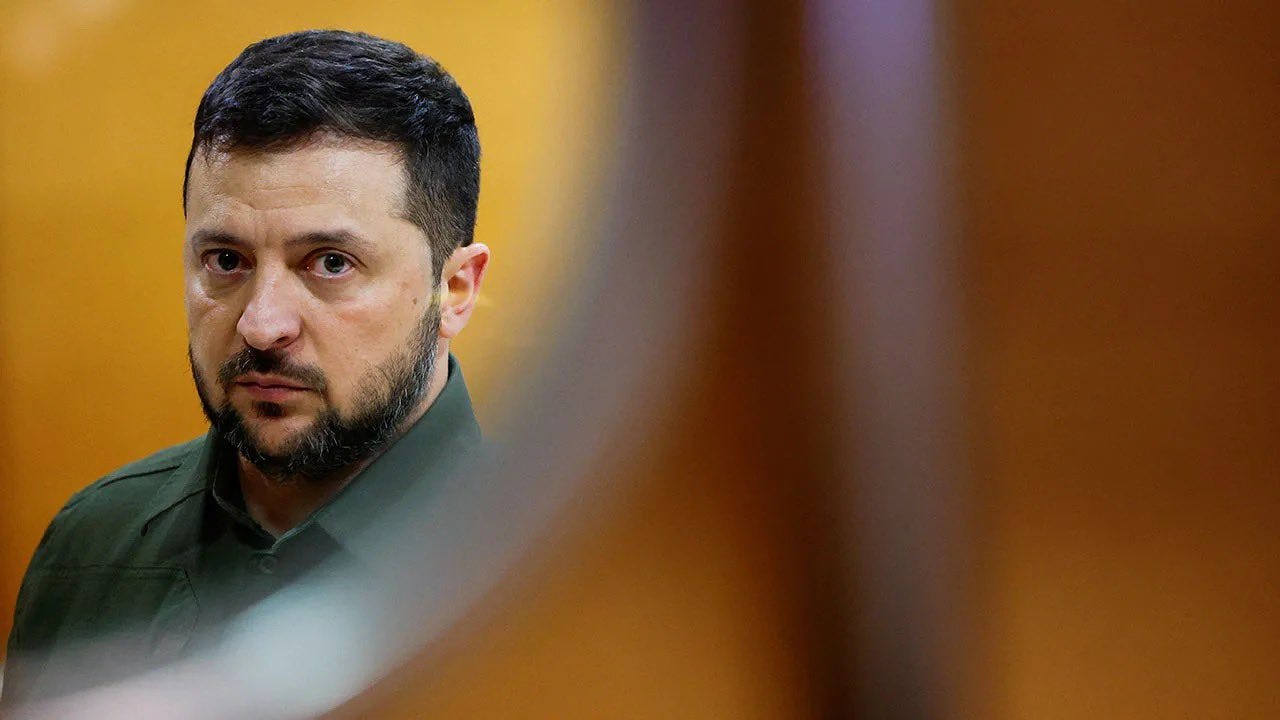⚠️ Power Consolidated, Oversight Crushed: Zelensky Moves Against Anti-Corruption Bodies
With a fractured parliament’s backing, Ukraine’s president tightens control over NABU and SAPO — dismantling post-Maidan reforms and risking EU funds, credibility, and trust.
In a controversial vote on Tuesday, Ukraine’s parliament approved legislation that critics say will gut the independence of the country’s top anti-corruption bodies — NABU and SAPO — and place them under executive control. Lawmakers opposed to the measure shouted “shame!” as the legislation, numbered ‘12414’ passed with 263 votes, fast-tracked to President Zelensky’s desk, the FT reported. The law grants sweeping powers to the prosecutor-general (a presidential appointee), including access to case files and authority to redirect investigations — moves that one MP warned would render the agencies “purely decorative.” The legislation was framed as a wartime tool to investigate missing persons, but comes just days after NABU launched a criminal case against Zelensky ally and former Deputy PM Oleksiy Chernyshov — the highest-ranking Ukrainian ever charged with abuse of power while in office. On the same day, the SBU raided NABU offices without court warrants, raising further alarms among civil society groups and Western allies. The EU and G7 ambassadors have voiced concern, warning the changes could jeopardize Ukraine’s EU membership bid and billions in aid tied to reform benchmarks. "Now the anti-corruption infrastructure – what was forged from the Euromaidan demand, the societal cry and the urgent need to tackle high-ranking corruption – has been shattered. Today, it lies in ruins, undermined even by those suspected by the anti-corruption prosecutor’s office,” said NABU Director Semen Kryvonos.
The EU's enlargement commissioner on Tuesday slammed a vote by Ukrainian lawmakers to remove the independence of two anti-corruption bodies in the war-torn country. "Seriously concerned over today's vote in the Rada. The dismantling of key safeguards protecting NABU's independence is a serious step back," Marta Kos wrote on X. Kos said the independence of the agency, and of an anti-graft prosecutor's office, were "essential for Ukraine's EU path" - France 24
Former vice-prime minister for European integration and chair of the Parliamentary Committee on Integration of Ukraine to the EU, Ivanna Klympush told her Twitter followers on Tuesday to “remember this day.” She added: “The servants with their crutches are finally turning the country away from the European integration course. The independence of the anti-corruption bodies NABU/SAP, which are key to democratic transformation, visa-free travel, and the future, is being destroyed.
Highly-regarded Germany-based security and geopolitical expert, Jessica Berlin, wrote that the reaction across EU capitals towards the legislation was one of “frustration, exasperation and outrage.” She added: If this bill becomes law, it will fuel Kremlin propaganda, betray the fait and sacrifices of the Ukrainian people and military, and undermine the trust of EU allies.”
In the center of Odesa, a protest took place against the bill that restricts the independence of NABU and SAPO. Participants of the protest (photo below - Credit Hromadske Radio) called on Zelensky not to sign the document and chanted: “Let’s protect democratic institutions.” A protest placard elsewhere said: “We won’t go back to (former Russian-backed President Viktor) Yanukovych times.” Thousands of protesters gathered near the presidential office, the Kyiv Post reported. “On Tuesday night, our reporters on the ground observed around 2,000 to 3,000 people – mostly young – rallying near the Ivan Franko Theater in central Kyiv. The demonstration – the first of its kind in wartime Kyiv – has stirred up memories of other times in Ukraine’s past when protesters changed the course of the country’s future.” Aside from the capital, protests took place in many other cities nationwide, the NGO Chesno reported
My Hot Take: Ukraine Shoots Itself in the Foot — Again: The controversial parliamentary vote to strip the independence of Ukraine’s top anti-corruption bodies is nothing short of self-sabotage. Yes, the bill still awaits President Zelensky’s signature — but its passage alone has already sparked shock in Brussels and beyond. It’s the clearest sign yet of a presidential administration increasingly bent on consolidating power, even at the expense of transparency, reform, and trust. In a single move, Ukraine risks jeopardizing billions in military and economic aid, and potentially stalling its EU accession — all for short-term political control. For those who still insist Ukraine’s corruption problem is “overblown,” I’d urge them to speak with the countless businesspeople who are stifled by bribes and red tape — or the Ukrainians abroad who say they won’t come back unless peace is matched by real reform. War is no excuse for backsliding. Zelensky’s government was elected on a promise of change. The West is watching. Ukrainians are watching. And they will not accept a return to the old ways. As thousands of protesters shouted in unison below the presidential complex today - ганьба (shame).
Since you’re here, if you’d like to support this work but haven’t yet, consider becoming a paid subscriber for exclusive access to my insights—or contribute via my Patreon page.
“We are losing the Ukraine that Maidan stood for – not even because of the Russians. It’s being destroyed today by the green lawmakers you elected, together with [Opposition Platform – For Life],” - Serhiy Hnezdilov, prominent blogger and infantryman of Ukraine’s 56th Brigade
Ukrainian and Russian delegations are expected to meet as soon as Wednesday for peace talks in Istanbul, the third round in a series of negotiations that began on May 16 -- and the first since US President Donald Trump threatened to impose new sanctions on Moscow if it doesn’t reach a deal with Kyiv by early September. Ukrainian President Volodymyr Zelenskyy has said the negotiations would be held in Istanbul on July 23. The Kremlin hasn’t confirmed the exact date, and Russian state news agency TASS cited an unnamed source as saying the talks would take place on July 24. Expectations for the talks are low. Aside from potential further prisoner exchanges, “my instinct is to say I expect nothing,” Kadri Liik, a senior policy fellow at the European Council on Foreign Relations. “I do not see either Kyiv or Moscow modifying their basic positions.” At the same time, analysts say, both sides may feel that given Trump’s continued efforts to push them towards peace, they cannot afford to abandon the process at this point – and that they, in addition to reuniting prisoners with their families, may have something to gain - RFE/RL
More than 1,000 Palestinians have been killed by Israeli forces since May while trying to access food in Gaza, mostly near aid sites run by a controversial American contractor, the UN human rights office said on Tuesday. Of the 1,054 people killed while trying to get food since late May, 766 were killed while heading to sites run by the Gaza Humanitarian Foundation (GHF), according to the UN. The GHF has proven to be a controversial body. Registered in Delaware and backed by Israel, it was established in February to distribute aid from four hubs in Gaza, replacing the UN system of distribution. In January, Israel banned the main UN organisation delivering aid to Palestinians in Gaza, UNRWA, from operating, claiming the agency turned a blind eye to Hamas members in its ranks. But the GHF had no previous experience of delivering aid to combat zones and its delivery method has been criticised by established aid groups. Deliveries at its four distribution sites across Gaza have often seen people killed, either in crowd crushes or after Israeli forces or security contractors opened fire near aid-seekers. Thameen al-Kheetan, a spokesperson for the UN rights office, says its figures come from "multiple reliable sources on the ground," including medics, humanitarian and human rights organisations. Palestinian witnesses and health officials say Israeli forces regularly fire toward crowds of thousands of people heading to the GHF sites. The military says it has only fired warning shots, and GHF says its armed contractors have only fired into the air on a few occasions to try to prevent stampedes. The GHF rejected what it said were "false and exaggerated statistics" from the United Nations. Desperation is mounting in the territory of more than 2 million, which experts say is at risk of famine because of Israel's blockade on what supplies can enter the Strip - Euronews
German Development Minister Reem Alabali Radovan said she would have liked Germany to join the list of 28 countries signed a statement demanding an end to the war in Gaza. Speaking to German regional newspaper Rheinische Post, the Social Democrat (SPD) politician called the statement a "signal." "What is happening in Gaza right now is unbelievable. Innocent children are dying. People are starving," she said. According to Alabali Radovan, an "immediate and sustainable ceasefire" is urgently needed. The foreign ministers of 25 countries published the joint statement on Monday, with Germany not being among them. "The civilian population in Gaza must not keep being crushed between the fronts," the German minister further wrote, also calling for Israel to observe international law and allow the safe passage of humanitarian aid - DW
UN Secretary-General Antonio Guterres said the level of destruction in Gaza under Israeli military attack was unprecedented in recent years and described the situation as a "horror show." "We need look no further than the horror show in Gaza — with a level of death and destruction without parallel in recent times," he said in a speech to the UN Security Council. Guterres said that escalated Israeli operations meant "devastation is being layered upon devastation," with the humanitarian system in its "last gasp."
** Tune into BBC World Television at the following times, when I will be discussing the situation in Gaza as well as a possible way forward: Tuesday: 1800 Pacific / 2100 Eastern. Wednesday: 0900 HK/SG; 1000 Seoul; 1100 Sydney
Azerbaijan has identified the person responsible for the downing of an Embraer ERJ-190 passenger plane near Grozny, according to the local media outlet Minval Politika. The commander of the Pantsir-S1 that shot down the civilian plane was Dmitry Sergeevich Paladychuk, commander of the No. 274 squadron. He is serving in the 1st Division of the 80th Anti-Aircraft Missile Regiment of the Mobile Reserve of the 14th Army (military unit No. 75564). An Embraer ERJ-190 passenger plane of Azerbaijan Airlines, flying from Baku to Grozny, declared an emergency at approximately 11:20 a.m. local time. Despite the crew’s requests for an emergency landing, the damaged aircraft was denied entry at all Russian airports. It was ordered to continue its flight across the Caspian Sea to the Kazakh city of Aktau. It is known that technical problems on board were confirmed during the flight over the Caspian Sea, as evidenced by video recordings made by passengers. According to the Azerbaijan’s President, the plane was initially disoriented by Russian electronic warfare. Almost simultaneously, the tail section of the aircraft was severely damaged by ground fire. The plane crash killed 38 people, including 23 citizens of Azerbaijan, 7 of Russia, and 6 of Kazakhstan - Militarnyi
North Korea has officially started construction on the country’s third Choe Hyon-class destroyer, according to state media on Tuesday, claiming it will be finished by the Oct. 10 party foundation holiday in 2026. The ship will be one of two destroyers Pyongyang plans to complete next year, in line with leader Kim Jong Un’s vow to build larger ships every year as part of an effort to transform the country’s long-neglected navy from a coastal fleet into a blue water force. The Nampho facility started building the first Choe Hyon-class destroyer in spring 2024, and Kim officially launched the ship in late April 2025, claiming it will be deployed to the east coast by early 2026. A second ship of the same class was built at Chongjin Shipyard on the northeast coast, officially launching in June this year at Rajin Shipyard up the coast after it initially capsized in May and had to be recovered and repaired. It’s also set to deploy on the east coast but later in mid-2026. North Korea has appeared to facilitate much faster shipbuilding than in the past by adopting a process of buying up large volumes of foreign cargo ships and breaking them down for materials at the Ryongnam Shipyard in Nampho, according to an nK Insight report by SI Analytics. Analysts have also posited that Russian assistance — repayment for sending DPRK troops and missiles to help Russia’s war on Ukraine — could be responsible for the improved shipbuilding capabilities. Amid the focus on warship construction, satellite imagery also shows that work has yet to resume on the large east coast naval base where the vessels are set to be deployed after years of abandonment - NK News
The US announced Tuesday that it would withdraw from the UN’s cultural and educational agency, UNESCO, at the end of next year, the Trump administration’s latest move to distance itself from international institutions. A White House spokesperson cited the agency’s “woke, divisive cultural and social causes,” as a reason for the withdrawal. UNESCO’s head said the move came as no surprise: It echoes US President Donald Trump’s first-term strategy of rejecting multilateral institutions, including the World Health Organization, the UN Human Rights Council, a global climate accord, and the Iran nuclear deal. The decision could hand a win to China, which has been making efforts to capitalize on Trump’s disdain for multilateralism by expanding its influence within the UN, Western diplomats told the Financial Times - Semafor







